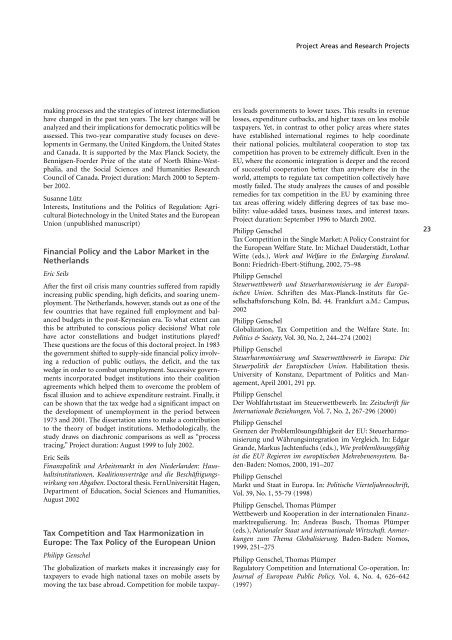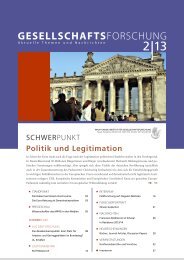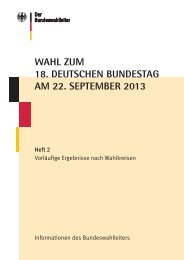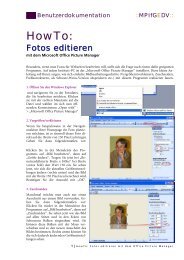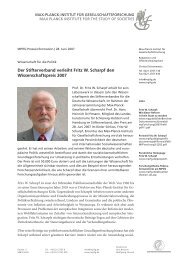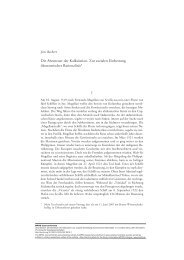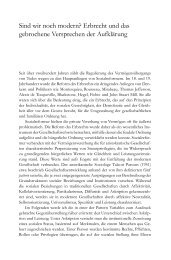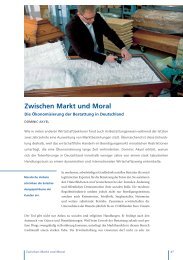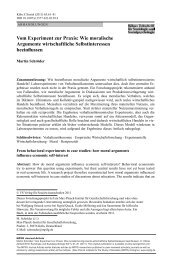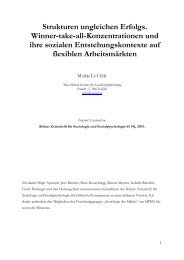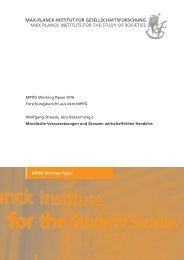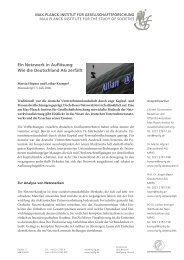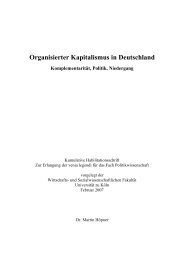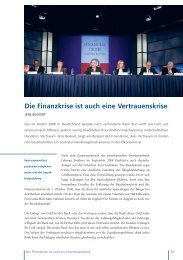Publications - MPIfG
Publications - MPIfG
Publications - MPIfG
You also want an ePaper? Increase the reach of your titles
YUMPU automatically turns print PDFs into web optimized ePapers that Google loves.
making processes and the strategies of interest intermediation<br />
have changed in the past ten years. The key changes will be<br />
analyzed and their implications for democratic politics will be<br />
assessed. This two-year comparative study focuses on developments<br />
in Germany, the United Kingdom, the United States<br />
and Canada. It is supported by the Max Planck Society, the<br />
Bennigsen-Foerder Prize of the state of North Rhine-Westphalia,<br />
and the Social Sciences and Humanities Research<br />
Council of Canada. Project duration: March 2000 to September<br />
2002.<br />
Susanne Lütz<br />
Interests, Institutions and the Politics of Regulation: Agricultural<br />
Biotechnology in the United States and the European<br />
Union (unpublished manuscript)<br />
Financial Policy and the Labor Market in the<br />
Netherlands<br />
Eric Seils<br />
After the first oil crisis many countries suffered from rapidly<br />
increasing public spending, high deficits, and soaring unemployment.<br />
The Netherlands, however, stands out as one of the<br />
few countries that have regained full employment and balanced<br />
budgets in the post-Keynesian era. To what extent can<br />
this be attributed to conscious policy decisions? What role<br />
have actor constellations and budget institutions played?<br />
These questions are the focus of this doctoral project. In 1983<br />
the government shifted to supply-side financial policy involving<br />
a reduction of public outlays, the deficit, and the tax<br />
wedge in order to combat unemployment. Successive governments<br />
incorporated budget institutions into their coalition<br />
agreements which helped them to overcome the problem of<br />
fiscal illusion and to achieve expenditure restraint. Finally, it<br />
can be shown that the tax wedge had a significant impact on<br />
the development of unemployment in the period between<br />
1973 and 2001. The dissertation aims to make a contribution<br />
to the theory of budget institutions. Methodologically, the<br />
study draws on diachronic comparisons as well as “process<br />
tracing.” Project duration: August 1999 to July 2002.<br />
Eric Seils<br />
Finanzpolitik und Arbeitsmarkt in den Niederlanden: Haushaltsinstitutionen,<br />
Koalitionsverträge und die Beschäftigungswirkung<br />
von Abgaben. Doctoral thesis. FernUniversität Hagen,<br />
Department of Education, Social Sciences and Humanities,<br />
August 2002<br />
Tax Competition and Tax Harmonization in<br />
Europe: The Tax Policy of the European Union<br />
Philipp Genschel<br />
The globalization of markets makes it increasingly easy for<br />
taxpayers to evade high national taxes on mobile assets by<br />
moving the tax base abroad. Competition for mobile taxpay-<br />
Project Areas and Research Projects<br />
ers leads governments to lower taxes. This results in revenue<br />
losses, expenditure cutbacks, and higher taxes on less mobile<br />
taxpayers. Yet, in contrast to other policy areas where states<br />
have established international regimes to help coordinate<br />
their national policies, multilateral cooperation to stop tax<br />
competition has proven to be extremely difficult. Even in the<br />
EU, where the economic integration is deeper and the record<br />
of successful cooperation better than anywhere else in the<br />
world, attempts to regulate tax competition collectively have<br />
mostly failed. The study analyzes the causes of and possible<br />
remedies for tax competition in the EU by examining three<br />
tax areas offering widely differing degrees of tax base mobility:<br />
value-added taxes, business taxes, and interest taxes.<br />
Project duration: September 1996 to March 2002.<br />
Philipp Genschel<br />
Tax Competition in the Single Market: A Policy Constraint for<br />
the European Welfare State. In: Michael Dauderstädt, Lothar<br />
Witte (eds.), Work and Welfare in the Enlarging Euroland.<br />
Bonn: Friedrich-Ebert-Stiftung, 2002, 75–98<br />
Philipp Genschel<br />
Steuerwettbewerb und Steuerharmonisierung in der Europäischen<br />
Union. Schriften des Max-Planck-Instituts für Gesellschaftsforschung<br />
Köln, Bd. 44. Frankfurt a.M.: Campus,<br />
2002<br />
Philipp Genschel<br />
Globalization, Tax Competition and the Welfare State. In:<br />
Politics & Society, Vol. 30, No. 2, 244–274 (2002)<br />
Philipp Genschel<br />
Steuerharmonisierung und Steuerwettbewerb in Europa: Die<br />
Steuerpolitik der Europäischen Union. Habilitation thesis.<br />
University of Konstanz, Department of Politics and Management,<br />
April 2001, 291 pp.<br />
Philipp Genschel<br />
Der Wohlfahrtsstaat im Steuerwettbewerb. In: Zeitschrift für<br />
Internationale Beziehungen, Vol. 7, No. 2, 267-296 (2000)<br />
Philipp Genschel<br />
Grenzen der Problemlösungsfähigkeit der EU: Steuerharmonisierung<br />
und Währungsintegration im Vergleich. In: Edgar<br />
Grande, Markus Jachtenfuchs (eds.), Wie problemlösungsfähig<br />
ist die EU? Regieren im europäischen Mehrebenensystem. Baden-Baden:<br />
Nomos, 2000, 191–207<br />
Philipp Genschel<br />
Markt und Staat in Europa. In: Politische Vierteljahresschrift,<br />
Vol. 39, No. 1, 55-79 (1998)<br />
Philipp Genschel, Thomas Plümper<br />
Wettbewerb und Kooperation in der internationalen Finanzmarktregulierung.<br />
In: Andreas Busch, Thomas Plümper<br />
(eds.), Nationaler Staat und internationale Wirtschaft. Anmerkungen<br />
zum Thema Globalisierung. Baden-Baden: Nomos,<br />
1999, 251–275<br />
Philipp Genschel, Thomas Plümper<br />
Regulatory Competition and International Co-operation. In:<br />
Journal of European Public Policy, Vol. 4, No. 4, 626–642<br />
(1997)<br />
23


